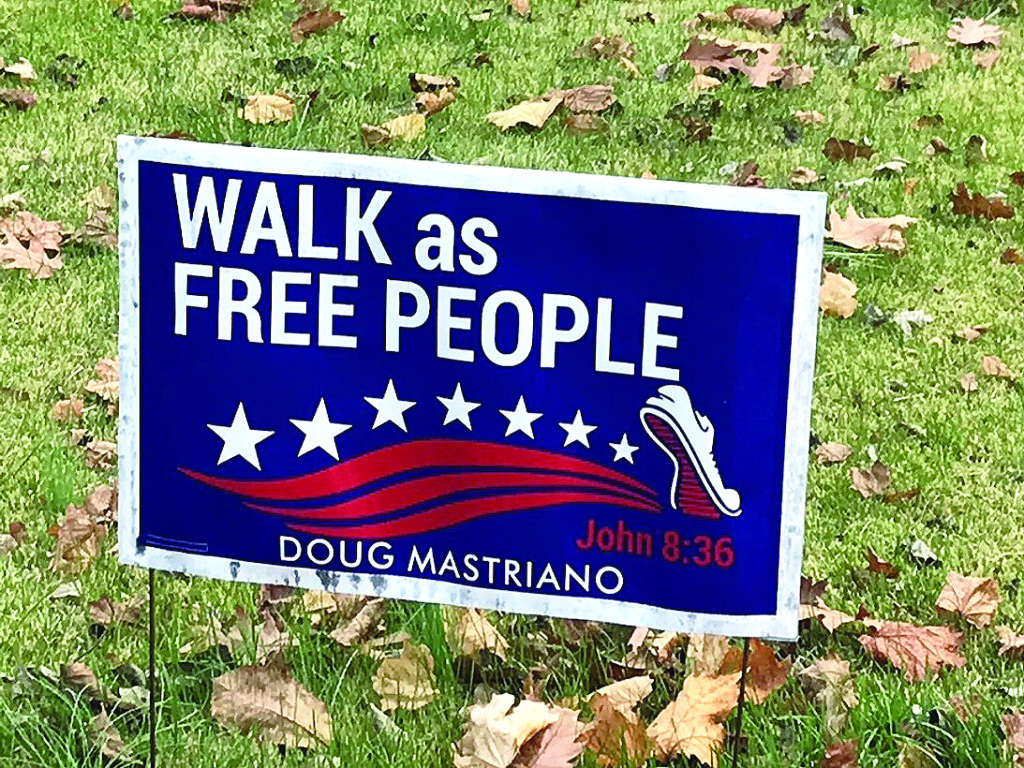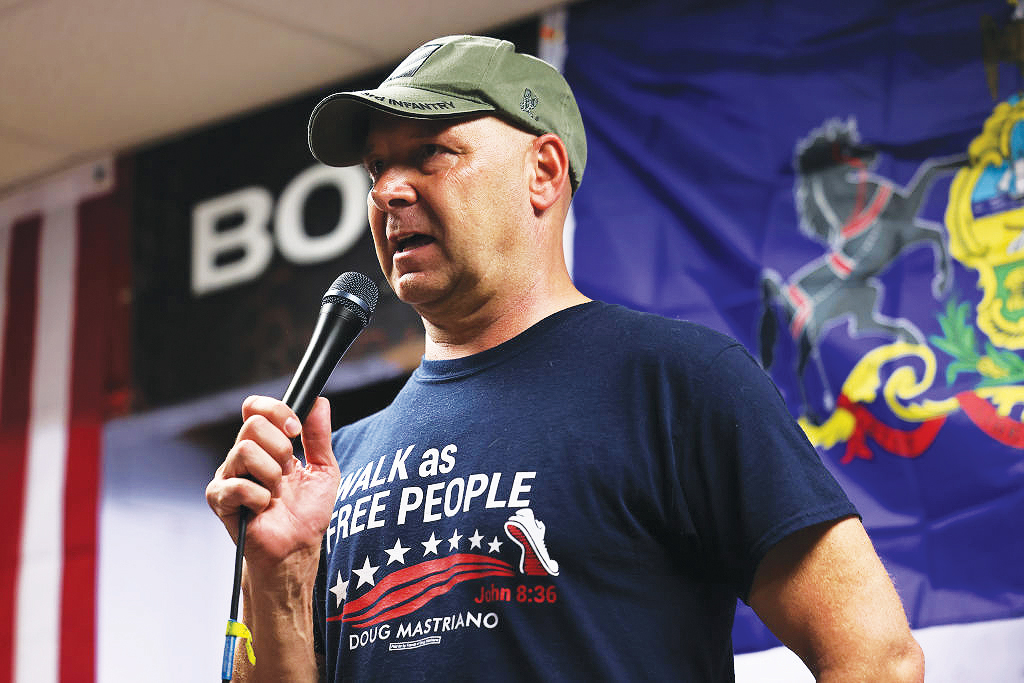Throughout the 2022 campaign season, Pennsylvanians grew accustomed to seeing yard signs for one candidate that prominently invoked a New Testament verse. Some of the signs had the candidate’s name in large letters, his running mate’s name a bit smaller and the reference to the Bible verse — “John 8:36” — discreetly placed on the bottom right. Others featured a very free translation from the verse — “Walk as Free People” — with the biblical citation and the candidate’s name below.

Biblical admonition: A Mastriano sign graces a lawn in Pennsylvania (Photo by Robert Shaffer)
The candidate, who also invoked this passage in his speeches, was Doug Mastriano, the Republican running for governor. A state senator who worked to overturn the results of the 2020 presidential election, Mastriano fell short by 15 points, losing to Democrat Josh Shapiro. So most Pennsylvania voters did not rally to this somewhat cryptic Bible verse, and perhaps these unusual yard signs will soon be forgotten.
But Mastriano is still in the state Senate, in the middle of a four-year term. Moreover, he had won convincingly in last year’s Republican primary, and in the general election, he carried his own county, in the southcentral part of the state, by a 2-1 margin. Thus, Mastriano and his followers remain an important, though by no means a majority, political force in Pennsylvania. Therefore, an in-depth look at this Bible verse and what it means for church-state relations — and for relations between Christians and people of other religions — is in order.
To be sure, there is nothing inherently wrong with a candidate using a religious phrase in a political campaign. Just as the U.S. Constitution states, in Article VI, that “no religious Test shall ever be required as a Qualification to any Office” of the United States, the First Amendment guarantees freedom of speech. But this particular biblical verse is problematic because it implies that only certain types of people are entitled to “freedom.”
In-depth articles in major media outlets — The New York Times, The Washington Post, The New Yorker, National Public Radio — routinely called Mastriano a Christian Nationalist, and he proclaimed on the campaign trail that the separation of church and state is a “myth.”

Mastriano: Proud Christian Nationalist (Photo by Michael M. Santiago/Getty Images)
His campaign adviser Jenna Ellis, who is evidently just as confused about what the Constitution says (or does not say) about Christianity as she was in her fact-free declarations as Donald Trump’s lawyer about the supposed fraud in the 2020 election, made clear at a Mastriano rally the campaign’s support for Christian Nationalism.
“What it really means to truly be America first,” she declared, “what it truly means to pursue happiness, what it truly means to be a Christian nation are all actually the same thing.”
And that brings us back to John 8:36, which several press accounts of Mastriano’s campaign mentioned but none fully analyzed. While his yard signs rendered it as “Walk As Free People,” the New Revised Standard Version — representative of other common translations — is much more specific: “So if the Son makes you free, you will be free indeed.”
This verse appears in a chapter in which Jesus is said to have demanded that Jews abandon Abraham as their “Father,” and in which he asserted that Jews who refuse to do so are both sinners and slaves. In other words, freedom comes only from belief in Jesus as the son of God. Slaves, of course, have no rights in society, as exemplified in the preceding verse, John 8:35, which was likely familiar to Mastriano’s followers: “The slave does not have a permanent place in the household; the son has a place there forever.”
While Mastriano has denied charges of antisemitism, the choice of this Bible verse as his campaign’s tagline openly broadcast disdain for Jews and other non-Christians. Indeed, New Testament scholars such as Rosemary Ruether, who wrote Faith and Fratricide: The Theological Roots of Anti-Semitism (1974), and Adele Reinhartz, author of Cast Out of the Covenant: Jews and Anti-Judaism in the Gospel of John (2018), believe that Chapter 8 of the Book of John lies at the heart of the long and tragic strain among some Christians of antisemitic thinking and actions.
John 8:36 is followed just a few lines later, in verse 44, with Jesus accusing his Jewish listeners of being descended “from your father the devil.” As Reinhartz has pointed out, one Klan-robed marcher at the violent “Unite the Right” rally in Charlottesville, Va., in 2017 carried a sign proclaiming, “Jews Are Satan’s Children — John 8:31-47.”
“Walk As Free People” takes on a very different and narrow-minded meaning in this full biblical context — “Love your neighbor” it is not. “Christian Nationalism” as Mastriano conveyed it is not about ethics in the usual sense, but about exclusion, pure and simple.
Moreover, Mastriano’s claim during the campaign that he was restoring Christianity to the privileged position in which the founders supposedly placed it was also at odds with the First Amendment’s prohibition of an establishment of religion. But we can delve deeper here, because Mastriano was running for governor of a state, and states, too, have constitutions.
The 1787 federal Constitution left a lot of leeway for states to establish policies, and some did mandate religious qualifications for office-holding and other religious preferences. Pennsylvania was not among these states, however. Its constitution of 1776 refused to discriminate among religions, and debates at the time made clear that Jews and Muslims, too, could win office under its aegis.
Pennsylvania’s 1874 Constitution, which with major reforms in 1968 and a few later modifications remains in effect, includes language that on the surface might give heart to the “Christian nation” crowd. The Preamble thanks “Almighty God for the blessings of civil and religious liberty” and invokes “His guidance” in devising this constitution.
But Article I, Section 3, restates quite plainly the “free exercise” and “no establishment” clauses of the U.S. Constitution: “All men have a natural and indefensible right to worship Almighty God according to the dictates of their own consciences,” and “no preference shall ever be given by law to any religious establishments or modes of worship.”
The section on qualifications for elected or appointed office is framed in negative terms: “No person who acknowledges the being of a God and a future state of rewards and punishments shall, on account of his religious sentiments, be disqualified…” This wording, of course, encompasses Jews and Muslims, as well as Christians of all denominations. It also curiously leaves the door open for polytheists, deists and the non-religious, since it does not affirmatively require their disqualification from such offices.
Nowhere is Jesus or Christianity mentioned in Pennsylvania’s constitution — nowhere.
And one of Mastriano’s major campaign planks was patently contrary to the state constitution. He proposed that half of state tax money targeted for education be restructured as vouchers and returned to individual students to pay for attendance at “public school, home school, private school, religious school.”
However, Article II, Section B, of the Pennsylvania Constitution states: “No money raised for the support of the public schools of the Commonwealth shall be appropriated to or used for the support of any sectarian school.” While some courts, unfortunately, have upheld similar voucher programs in other states, one would hope that this crystal-clear language would prevent the implementation of any such proposal in Pennsylvania.
Of course, religious freedom and freedom of speech provide Mastriano and others the right to call for the establishment, both in the U.S. and in Pennsylvania, of governments based on their version of Christianity. But such advocacy, far from returning these institutions to traditional principles, overturns them. And in the case of Doug Mastriano’s brand of Christian Nationalism, it overturns our constitutional principles — and marginalizes non-Christians — based on one of the more intolerant passages in the New Testament.
Robert Shaffer is professor emeritus of history at Shippensburg University of Pennsylvania and a longtime member of Americans United.


